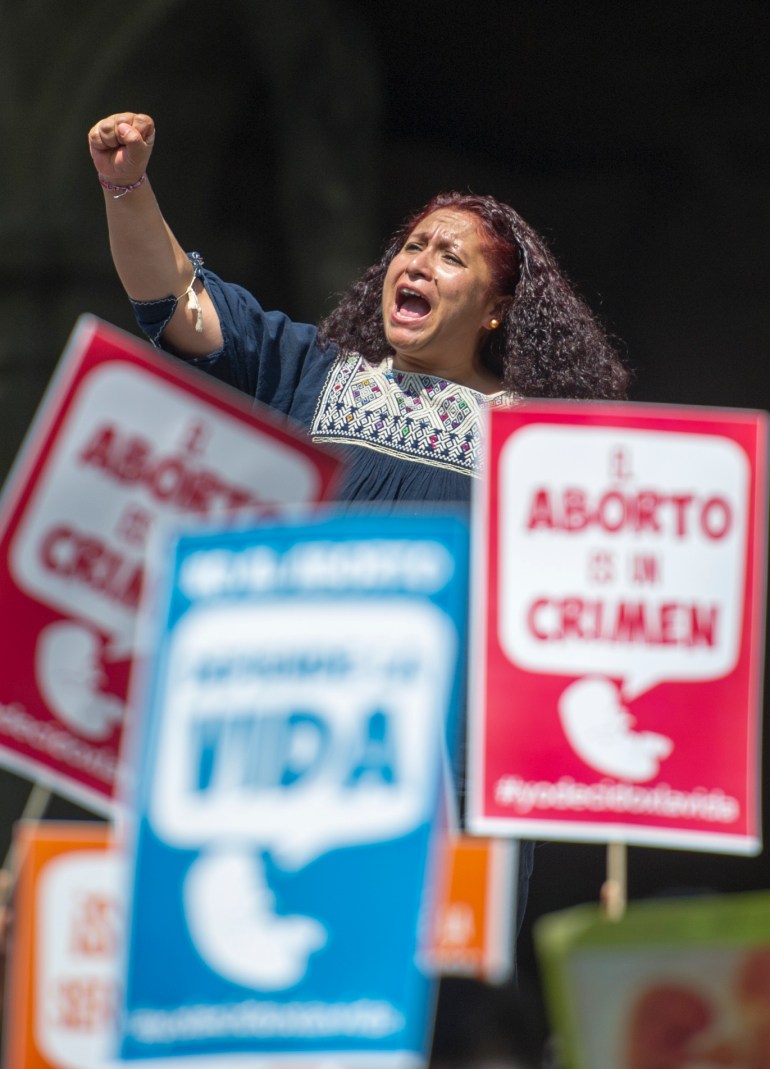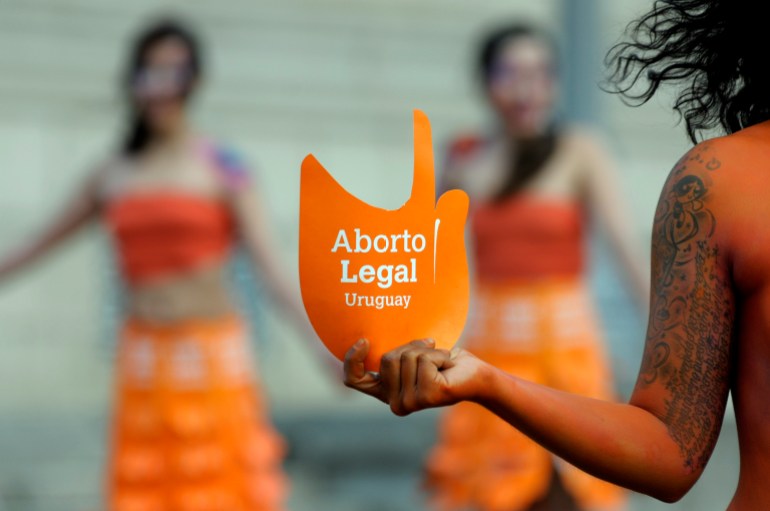With US poised to restrict abortion, other countries ease access
While US Supreme Court may overturn landmark abortion rights ruling, courts in other nations are moving to do the opposite.

As the United States Supreme Court appears on the verge of possibly overturning the landmark ruling that gave women the constitutional right to access abortions, courts in many other parts of the world have been moving in the opposite direction.
In February, Colombia’s Constitutional Court legalised abortion until the 24th week of pregnancy, part of a broader trend seen in parts of heavily Catholic Latin America.
Keep reading
list of 3 items‘Dismantling democracy’: US abortion advocates vow to fight
Abortion rights take centre stage in US midterm election year
It is not yet clear what effect there will be outside the US from the leaked draft opinion suggesting the country’s top court could overturn the landmark 1973 Roe v Wade decision.
But for women’s activists who for years have led grinding campaigns demanding open access to abortion, often looking to the US as a model, it is a discouraging sign and a reminder that hard-won gains can be impermanent.
“It is an awful precedent for the coming years for the region and the world,” said Colombian Catalina Martinez Coral, Latin America and Caribbean director for the New York-based Center for Reproductive Rights, which was among the groups that litigated the abortion case in Colombia’s high court.
❗Important reminder: Abortion is still available and legal in all 50 U.S. states❗
If you need help finding care, visit https://t.co/cpp7YidZe3 or text “Hello” to 435-334-6337 for a list of the abortion providers closest to you. #AbortionIsEssential
— Center for Reproductive Rights (@ReproRights) May 4, 2022
The February ruling there established a broad right for women to have abortions within the 24-week period, whereas previously they could do so only in specific cases, such as if a fetus presented malformations or a pregnancy resulted from rape. Abortion is still allowed after that period under those special circumstances.
The decision fell short of advocates’ hopes for complete decriminalisation, but Martinez Coral said it still left Colombia with the “most progressive legal framework in Latin America”.
Similarly, Mexico’s Supreme Court held last year that it was unconstitutional to punish abortion. As the country’s highest court, its ruling bars all jurisdictions from charging a woman with a crime for terminating a pregnancy.
Statutes outlawing abortion are still on the books in most of Mexico’s 32 states, however, and non-governmental organisations that have long pushed for decriminalisation are pressing state legislatures to reform them. Abortion was already readily available in Mexico City and some states.
To the south in Argentina, lawmakers in late 2020 passed a bill legalising abortion until the 14th week and after that for circumstances similar to those described in the Colombia ruling. It is also widely available in Cuba and Uruguay.

But the expansion of abortion access has not extended to all of Latin America, with many countries restricting it to certain circumstances — such as Brazil, the region’s most populous nation, where it is permissible only in cases of rape, risk to the woman’s life and certified cases of the birth defect anencephaly.
Other places have total bans with no exceptions, such as Honduras, Nicaragua and El Salvador. Courts in the latter have given women long prison sentences for aggravated homicide.
Many African nations also maintain complete bans, but in October 2021, Benin legalised abortion in most circumstances up to 12 weeks. That significantly increased safe access to the procedure after the health minister reported that nearly 200 women were dying each year of complications from clandestine abortions. Previously abortion was permitted in cases of rape or incest, risk to the woman’s life, or severe fetal malformation.
Most European countries have legalised abortion, including predominantly Catholic ones. Ireland did so in 2018, followed by tiny San Marino in a voter referendum last September. It remains illegal in Andorra, Malta and Vatican City, while Poland last year tightened its abortion laws.
It is also been widely available in Israel since 1978 and relatively uncontroversial, allowed by law before the 24th week with the approval of hospital “termination committees” that consist of medical professionals including at least one woman.
Abortion has been legal up to 12 weeks in Tunisia for decades, but in Iran, it has been forbidden since the 1979 Islamic Revolution. Last year, the leader of Cairo’s top institution of Islamic leaders, Al-Azhar, said abortion is not the solution even in cases where a child is likely to be seriously ill or disabled.

In Japan, abortion is allowed only for economic and health reasons, and requires partners’ consent, making Japan one of a handful of countries in the world to do so. Victims of sexual violence are excluded from the requirement.
Abortion has been legal in India since 1971. Women can terminate a pregnancy up to 20 weeks, but only on a doctor’s advice. Under changes in 2021, a woman can also seek an abortion up to 24 weeks under certain circumstances such as rape or incest, though it requires approval from two doctors.
China is moving to limit abortions, but that is because it has one of the highest rates of abortions in the world.
Last September, the Chinese cabinet, known as the State Council, published new national guidelines that require hospitals to “reduce non-medically necessary abortions”. In February, China’s family planning association announced it would launch a campaign to reduce teenage abortions.
When the US Supreme Court’s final decision is handed down, expected in late June or early July, the world will be watching.